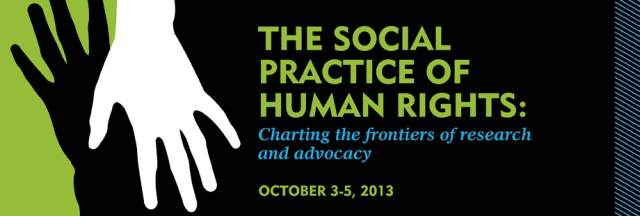Paper/Proposal Title
Bridging the Religious-Secular Divide within Transnational Women’s Movements? Muslim-Western Partnerships for Women’s Rights
Location
River Campus - Room 2080
Start Date
10-4-2013 9:30 AM
Abstract
Across the “Muslim world”, women play key roles in petitioning for political and legal reform, combating religious extremism and advancing women’s rights. Their activism has received significant interest in the West, with Western organizations increasingly seeking partnerships with women’s groups in Muslim-majority countries. Yet, Muslim women’s rights are contested in a global religio-political context in which distrust of Islam persists on one side while fear of Western secular imperialism pervades on the other. For women’s rights activists—whether religious or secular, Western or living in a Muslim country—this global dilemma can be challenging terrain.
This paper explores how Muslim-Western partnerships are working across religious, secular and cultural divides to advance women’s rights. How are they affecting, and affected by, the broader religio-political context, in which increasing fundamentalisms and politicized religion disproportionately impact women’s rights? Based on an in-depth case study enhanced through interviews with a sample of Muslim-Western partners, I argue that religious-secular partnerships are most effective when they privilege local religious and cultural advocacy strategies. Rather than stand in opposition to one another, secular and religious frameworks of women’s rights can be compatible and complimentary—when the partnership recognizes Muslim women as agents of their own religiosity. This paper draws from and contributes to scholarship on religion and transnational women's movements, bringing important insights on the dynamic gendered experiences with religion and secularism in our current era—a topic of growing priority for scholars, policy makers and activists alike.
Bridging the Religious-Secular Divide within Transnational Women’s Movements? Muslim-Western Partnerships for Women’s Rights
River Campus - Room 2080
Across the “Muslim world”, women play key roles in petitioning for political and legal reform, combating religious extremism and advancing women’s rights. Their activism has received significant interest in the West, with Western organizations increasingly seeking partnerships with women’s groups in Muslim-majority countries. Yet, Muslim women’s rights are contested in a global religio-political context in which distrust of Islam persists on one side while fear of Western secular imperialism pervades on the other. For women’s rights activists—whether religious or secular, Western or living in a Muslim country—this global dilemma can be challenging terrain.
This paper explores how Muslim-Western partnerships are working across religious, secular and cultural divides to advance women’s rights. How are they affecting, and affected by, the broader religio-political context, in which increasing fundamentalisms and politicized religion disproportionately impact women’s rights? Based on an in-depth case study enhanced through interviews with a sample of Muslim-Western partners, I argue that religious-secular partnerships are most effective when they privilege local religious and cultural advocacy strategies. Rather than stand in opposition to one another, secular and religious frameworks of women’s rights can be compatible and complimentary—when the partnership recognizes Muslim women as agents of their own religiosity. This paper draws from and contributes to scholarship on religion and transnational women's movements, bringing important insights on the dynamic gendered experiences with religion and secularism in our current era—a topic of growing priority for scholars, policy makers and activists alike.




Comments
This biennial conference provides a unique space for scholars, practitioners and advocates to engage in collaboration, dialogue and critical analysis of human rights advocacy — locally and globally. Learn more about the Human Rights Center at the University of Dayton >>>.